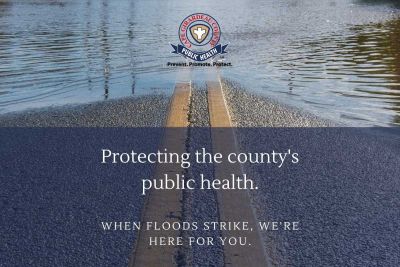Emergencies, such as a flood can happen anytime and change lives. Information and preparation now can help save lives later. To help Cape Girardeau County families, this is important information to know and share with your loved ones.
Flooding is a temporary overflow of water onto land that is normally dry, and is the most common natural disaster in the United States.
Preparing
Flood Insurance
Purchase or renew a flood insurance policy. Homeowner’s insurance policies do not cover flooding. It typically takes up to 30 days for a policy to go into effect so the time to buy is well before a disaster.
Cape Girardeau County Assistance and Floodplain Regulation: Cape Girardeau County participates in the National Flood Insurance Program (NFIP) in order for home and business owners to be able to purchase flood insurance. The County and the NFIP require County property owners that have experienced flooding in their home or business to contact the Cape Girardeau County Floodplain Administrator to obtain a permit to repair a flood damaged structure. The Floodplain Administrator can also assist flooded property owners to access up to $30,000 additional funds to help eligible owners recover from the flood through the Increased Cost of Compliance insurance program.
Contact the County Floodplain Administrator:
| (573) 243-3123 |
Ready 3
An approach that recommends you: 1) create a plan 2) prepare a kit, and 3) listen for information. It's endorsed by the American Red Cross and can help you prepare for many kinds of emergencies. To learn more, click here.
Plan Ahead
Make a plan for your household, including your pets, so that you and your family know what to do, where to go, and what you will need to protect yourselves from flooding. Gather supplies, including non-perishable foods, cleaning supplies, and water for several days, in case you must leave immediately or if services are cut off in your area.
Immunizations: flood workers and anyone spending time around flooding disasters need to be sure their tetanus immunization is up to date (administered once every 10 years). Tetanus shots are available at the Cape Girardeau County Health Center.
Emergencies
Keep important documents in a waterproof container; create password-protected digital copies; protect your property; move valuables to higher levels; declutter drains and gutters; install check valves; consider a sump pump with a battery.
To learn more about preparing for a flood, click here.
Staying Safe During
- Find safe shelter right away
- Do not walk, swim or drive through flood waters
- Remember, just six inches of moving water can knock you down, and one foot of moving water can sweep your vehicle away
- Stay off bridges over fast-moving water
- Depending on the type of flooding:
- Evacuate if told to do so
- Move to higher ground or a higher floor
- Stay where you are
To learn more about staying safe during a flood, click here.
Staying Safe After
Be patient
Pay attention to authorities for information and instructions. Return home only when authorities say it is safe.
Vital Records: click here to find information on obtaining Missouri birth, death, marriage and divorce records lost or destroyed due to recent storms or flooding.
Beware
Electrical safety is most important in floods. Do not touch electrical equipment if it is wet or if you are standing in water. Make sure that electrical service is disconnected and cannot be turned on before entering any structure. Turn off any outside gas lines at the tank or meter, and let the building air out for several minutes to remove gas fumes. Check the following to ensure your safety:
- Does your outside inspection show the structure is safe?
- Is there structural damage and is it safe to enter the building?
- Do you see electrical shorts and live wires?
- Avoid wading in floodwater as underground or downed power lines can also electrically charge the water
Returning to Flood Damage: please see Precautions for Returning to Flood-Damaged Homes or Buildings for a fuller scope of guidance.
Be safe
People with asthma and other lung conditions and/or immune suppression should not enter buildings with indoor water leaks or mold growth that can be seen or smelled. Children should not take part in disaster cleanup work.
Food Safety: please see Safe Drinking Water After a Flood, Food Clean Up, and Food Safety After a Flood for valuable guidance. Parents and caregivers are presented with additional challenges in feeding infants and children safely in a post-disaster environment. Click here for tips on feeding your infant or child safely when disaster strikes.
To learn more about staying safe after a flood, click here.
Remember that failing to evacuate flooded areas or entering flood waters can lead to injury or death. With preparation and information, you can stay safe and even save lives. To help, we've also compiled valuable resources found below. Together, we can keep families in Cape Girardeau County safe.

